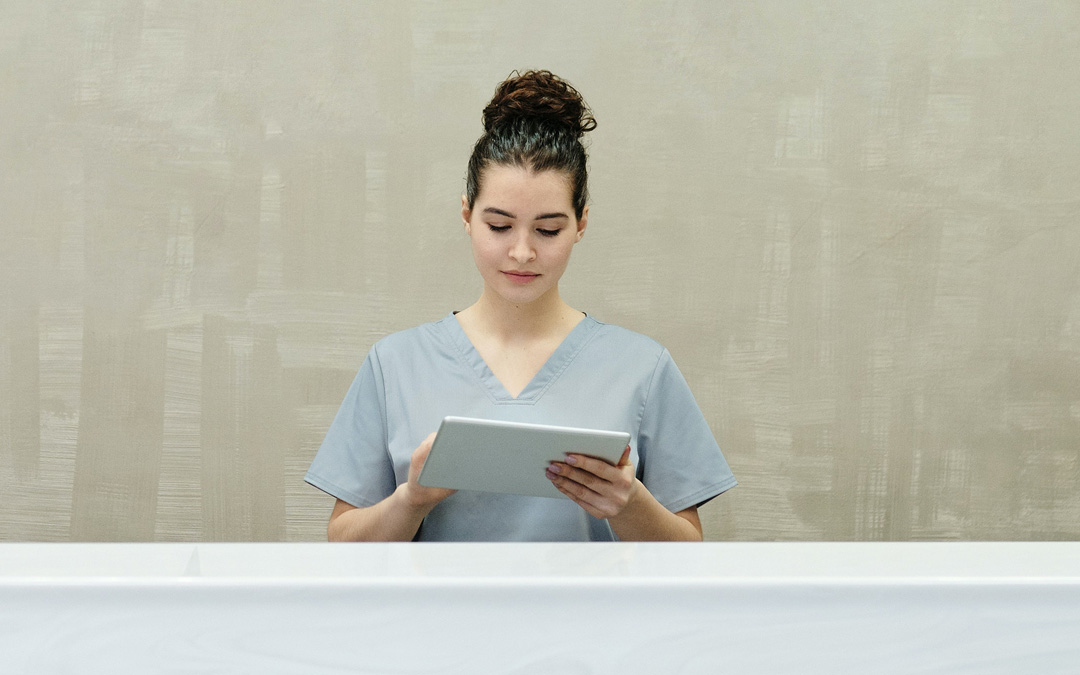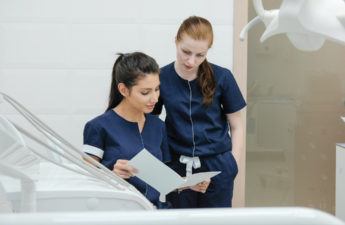Medical receptionists, also known as medical office assistants or medical administrative assistants, play an important role in keeping medical offices operating smoothly.
Working in the offices of doctors, dentists, specialists, and other healthcare professionals, they manage the administrative side of things, such as scheduling and billing. This lets doctors and nurses concentrate on patient care, knowing their practices are in safe hands.
They are versatile people, needing to be knowledgeable on basic medical procedures and equipment, managing electronic health records and patient management programs, and interacting with patients, doctors, vendors and more.
So, what exactly are the duties of this versatile and important medical office career?
Greeting, registering, and guiding patients.
Medical receptionists are the first person patients interact with, so it’s no exaggeration to say that first meeting can set the tone for the entire appointment (and any future encounters).
They need to ask patients the right questions to ensure they’re getting the information and treatment they need. They also help in filling out registration and insurance forms, guide patients to their exam rooms, and often perform preliminary tests like checking height, weight, temperature, and blood pressure.
Medical receptionists also ensure exam rooms are properly prepared, answer inquiries from outside medical offices, and manage busy waiting rooms.
Scheduling appointments and organizing referrals.
A well-scheduled office is a well-run office, and medical receptionists spend a lot of time juggling appointments, referrals and follow-ups.
They manage not only booking routine appointments, but finding space to fit in urgent care appointments, and ensure referrals to outside specialists happen seamlessly for patients.
They follow up with patients to remind them of appointments, ask for needed records, and ensure outside medical professionals are passing along needed test results and exam notes.
Handling the questions and concerns of patients.
A patient’s health can be a sensitive topic, and helping them navigate the medical world with tact and kindness is a big part of being in a medical receptionist career.
Doctors need to spend their time treating and helping people, so medical receptionists handle a wide range of topics for patients: answering questions about appointments and basic health advice, guiding patients through their next steps in treatment, understanding x-rays and lab test results, billing enquiries, and more.
Communicating clearly, effectively and warmly is key to successfully helping patients.
Updating and filing patient records and reports.
Administrative tasks make up a large part of a medical receptionist’s responsibilities. With the amount of private information they have access to, it’s important that they’re able to stay organized and ensure they don’t share confidential knowledge.
Patient records need to be updated and filed after appointments, while insurance forms and medical bills need to be completed and followed up on. And since many patients have other doctors and specialists they see, medical receptionists need to manage info from many places.
Managing office equipment and medical supplies.
One of the most important duties of a medical receptionist is ensuring their offices have what they need to run smoothly. They need to watch inventory levels and anticipate the needs of their fellow medical staff.
They’ll handle ordering everything from office supplies like printer paper, prescription pads, and pens, to medical supplies like uniforms, exam equipment, and sterilizing agents. They’ll even ensure magazines, games, and toys are in ample supply in the waiting room.
Medical receptionists also interact with pharmaceutical sales reps, equipment vendors, landlords, and repairmen. Their efforts are key in keeping an office in tip top shape.
Be ready for medical receptionist jobs in less than a year with the Academy of Learning Career College.
Enrolling in the Medical Receptionist program provides you with the knowledge and training you need to meet the demands of today’s medical offices. You’ll be able to choose your start date, work around your schedule, and learn at your own pace.
A medical receptionist career is possible with Albion College. Contact us today.



